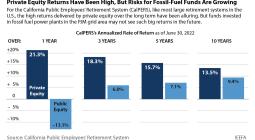Maine Voters Vote ‘No’ to Replacing Investor-Owned Utilities with Non-Profit

Maine voters have rejected a campaign to buy out the region’s two main corporate utilities, with implications for climate buy-in and utility ownership across the United States.
The vote on Tuesday included Ballot Question 3, asking Mainers if they wanted to replace Central Maine Power (CMP) and Versant Power with a new non-profit, Pine Tree Power. The measure was defeated, with 69.8% opposing a takeover and 30.2% in favour.
The decisive loss raises questions, in Maine and across the country, “about how far the public is willing to go to accelerate grid decarbonization and improve customer satisfaction,” Canary Media writes.
This is not the first time Maine has considered ousting the two utilities, which are known for their high costs and poor customer service. Citizen-initiated legislation put the matter up for votes in 1973 and 2021.
This time around, the two utilities were concerned enough to spend millions of dollars campaigning against the measure. CMP, through its parent company Avangrid, which is owned by Spanish firm Iberdrola, spent US$23 million opposing the measure. And Versant, through its Canada-based parent company Enmax, spent nearly $16 million,.
In comparison, Pine Tree Power’s advocates—led by the Our Power coalition—spent a paltry $1.3 million, and had to overcome “the inertia that favours the status quo,” writes Canary Media. A tall order even if it was a “deeply unpopular status quo, in which more than 100,000 Mainers have been erroneously billed by their utilities.”
Advocates say there is no way of knowing whether higher spending would have changed the outcome.
In the lead up to voting day, both sides were busy communicating the measure’s perceived pros and cons. Proponents pointed to one set of studies to say the ballot measure would save money in the long run, give residents ownership and improve performance, and remove the barrier of slow corporate action on greening the grid. Opponents pointed to other reports that said the buyout would break the state’s budget and lead to lengthy legal battles, all while failing to guarantee better performance.
Canary Media suggests a silver lining on the failed vote: “It’s possible that the spotlight pointed at the utilities by this high-profile ballot initiative will push them to make progress on customer service and connecting clean energy to the grid.”
CMP says it’s turning the page on the referendum. “As we look forward, we must continue to modernize our grid to support Maine’s climate change goals, connect new renewable resources, and electrify our communities,” the company said in a statement.
But many Maine residents still have issues with their service, and the state has some of the highest power rates in the country, along with some of the longest and most frequent outages. Both CMP and Versant have a long history of ranking at the bottom of customer satisfaction, says the Rhode Island Current.
While voters turned down Question 3, climate advocates can still push for more stringent action through regulatory structures, and the state legislature can take steps to ensure that the utilities improve their service, Canary Media writes. In fact, Maine recently adopted “performance-based regulation” to tie utility profits to meeting certain metrics determined to be for the public good.
In the end, even though Pine Tree Power lost two-thirds of the vote, proponents are pointing to the one-third that supported it despite their campaign being outspent 30–1.
“This campaign started a really crucial conversation both for Maine and for the nation about the failure of our investor-owned utility system,” said Our Power deputy campaign manager Lucy Hochscartner. “That conversation continues.”




